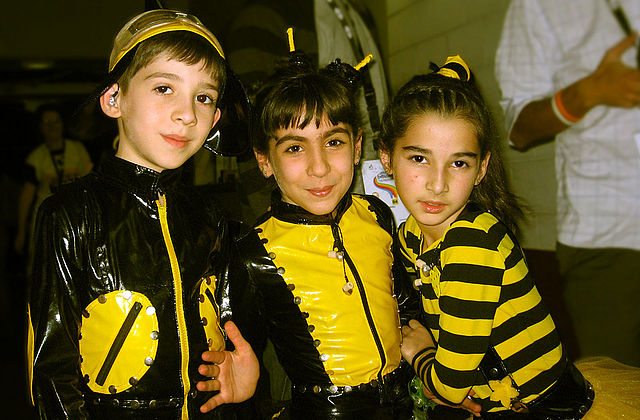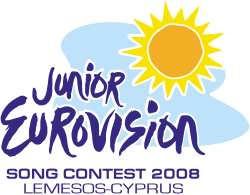Top Qs
Timeline
Chat
Perspective
Junior Eurovision Song Contest 2008
International song competition for youth From Wikipedia, the free encyclopedia
Remove ads
The Junior Eurovision Song Contest 2008 was the sixth edition of the Junior Eurovision Song Contest, held on 22 November 2008 at the "Spyros Kyprianou" Athletic Centre in Lemesos, Cyprus, and presented by Alex Michael and Sophia Paraskeva. It was organised by the European Broadcasting Union (EBU) and host broadcaster the Cyprus Broadcasting Corporation (CyBC). The theme of the event was "Fun in the Sun".[2] Broadcasters from fifteen countries participated in the contest.
The winner was Georgia with the song "Bzz.." by trio Bzikebi. Ukraine took 2nd place and Lithuania finished 3rd.[3] Bzikebi also became the first group act to win the Junior Eurovision Song Contest.
For the contest, various changes to the rules were made. One was that adults could assist children to write the songs submitted to their national broadcaster; previously only children could write the songs, with no assistance from adults. Another change was only six people could be on stage during a performance, instead of eight. The most significant change, however, was only half of the vote was decided by the tele-voters. Before the 2008 contest tele-voters completely decided the whole result. The other half of the result was decided by a jury of adults and children.[4][5]
Remove ads
Location
Bidding phase and host selection
On 27 May 2007, the Eurovision Steering Group decided to award CyBC of Cyprus the rights to host the 2008 contest, over bids from TV4 of Sweden and NTU of Ukraine, the latter of which would later host the 2009 edition. RTP of Portugal had also submitted a bid, however it was withdrawn at an early stage,[6] and the country went on to withdraw from the competition altogether.[7]
Venue

The Spyros Kyprianou Athletic Center[8] (Greek: Αθλητικό Κέντρο "Σπύρος Κυπριανού"), also known as Palais des Sports, is the largest multi-purpose indoor athletics arena in Cyprus. It is named after the late president of Cyprus Spyros Kyprianou. The shuttle of the centre can host more than 6,255 spectators and at least 42 wheelchair spots. Moreover, the centre is used especially for the sport events of local schools in Limassol greater area.[9]
Remove ads
Participants
Summarize
Perspective

Fifteen countries took part in the 2008 Junior Eurovision Song Contest: Armenia, Belarus, Belgium, Bulgaria, Cyprus, Macedonia, Georgia, Greece, Lithuania, Malta, Netherlands, Romania, Russia, Serbia, and Ukraine.[10] Portugal, which had taken part twice since 2006 announced that it was no longer interested in the contest and withdrew along with Sweden, a founding country in 2003, which left because of other broadcasting plans during the time of the event.[7][11][better source needed] Portugal would return in 2017 after winning the adult contest for the first time that same year.[12]
On the other hand, Israel and Bosnia and Herzegovina announced their intention to participate, but decided both to withdraw before the contest. Welsh language broadcaster S4C considered the possibility of participation, but in the end it was decided they would not to participate in the competition, because their debut was rejected because Wales isn't a sovereign state. Only the BBC has the exclusive right to represent the United Kingdom.[13][better source needed] Wales later debuted in the 2018 contest.
Azerbaijan announced its intention to take part also, but withdrew from the contest in early October. According to İctimai Televiziya və Radio Yayımları Şirkəti, the network was unable to select and prepare children for such a high scale event without proper help from other governmental structures and bodies. The broadcaster also confirmed payment of a fine to the EBU due to its late withdrawal.[14][better source needed] Poland had also considered participation but decided that it would not take part this year.[15] The 2008 contest was the first Junior Eurovision Song Contest to have no debuting countries.
Prior to the event, a compilation album featuring all the songs from the 2008 contest, along with karaoke versions, was put together by the European Broadcasting Union and released by Universal Music Group on 10 October 2008.[16]
Remove ads
Format
Summarize
Perspective
Visual design
The stage, which was designed by George Papadopoulos,[18] was nominated for the prestigious international "Live Design Excellence Awards".[19] The design is an abstract composition and consists of a round stage representing the island of Cyprus, real water along the front of the stage, two jetties, the waves breaking and moving away from the island and five sailing boats with oars. During the competitive performances, a beach ball with the design of the performer's national flag would be floating in the on-stage pond while they were performing.
The stage was constructed between 30 October 2008 and 14 November 2008.
Presenters
On 10 September 2008, the hosts were announced as Alex Michael and Sophia Paraskeva; both presenters with Cypriot backgrounds.[20]
Running order
On 13 October 2008, the draw of the running order took place live on CyBC 1. This involved drawing the first and last countries and performers, and then drawing countries into various 'pots' to decide when they would perform.[21] The full running order was announced on 14 October 2008.[22]
Voting
As in all previous Eurovision Song Contests each country gave their top 10 countries songs points from 1 point for their 10th favourite song up until 8 points for their 3rd favourite song. Then 10 and 12 points were given for the second favorite and favorite respectively. However, the difference between this contest and other past contests is this is the first Eurovision Song Contest that implements a jury vote that counts for half of each countries vote.[23] Profits made from the televoting was donated to UNICEF.[24]
Contest overview
Summarize
Perspective
The event took place on 22 November 2008 at 21:15 EET (20:15 CET).[25][26] Fifteen countries participated, with the running order published on 14 October 2008.[22] For the first time, all the countries competing were eligible to vote through a 50% jury and 50% televoting system.[b] Georgia won with 121 points, with Ukraine, Lithuania, Malta, and Macedonia completing the top five. Belgium, Serbia, the Netherlands, Greece, and Bulgaria occupied the bottom five positions.[27]
The opening of the show featured a dance act featuring Yiorgos Ioannides and Mariam Venizelou. During the interval, Eurovision 2008 winner Dima Bilan performed two songs during the interval, alongside Evridiki and her husband Dimitris Korgialas who performed the theme song of the contest, "Fun in the Sun".[28] Closing the interval, all participants performed the song "Hand in Hand", which was written especially for UNICEF and the Junior Eurovision Song Contest that year.[29]
Spokespersons
 Romania – Iulia Ciobanu
Romania – Iulia Ciobanu Armenia – Mary Sahakyan
Armenia – Mary Sahakyan Belarus – Anjelica Misevich
Belarus – Anjelica Misevich Russia – Sarina
Russia – Sarina Greece – Stefani Trepekli
Greece – Stefani Trepekli Belgium – Chloé Ditlefsen
Belgium – Chloé Ditlefsen Bulgaria – Marina Baltadzi
Bulgaria – Marina Baltadzi Serbia – Anđelija Erić
Serbia – Anđelija Erić Malta – Francesca Zarb
Malta – Francesca Zarb Netherlands – Famke Rauch
Netherlands – Famke Rauch Ukraine – Marietta
Ukraine – Marietta Lithuania – Lina Joy
Lithuania – Lina Joy Cyprus – Christina Christofi
Cyprus – Christina Christofi Georgia – Ana Davitaia
Georgia – Ana Davitaia Macedonia – Marija Zafirovska
Macedonia – Marija Zafirovska
Remove ads
Detailed voting results
Summarize
Perspective

Georgia and Macedonia awarded their points last due to technical problems.
12 points
Below is a summary of all 12 points received. All countries were given 12 points at the start of voting to ensure that no country finished with nul points.
Remove ads
Other countries
For a country to be eligible for potential participation in the Junior Eurovision Song Contest, it needs to be an active member of the EBU.
 Azerbaijan – Azerbaijan was originally going to participate but withdrew on 15 October 2008, due to the lack of participants signed up for the national final.
Azerbaijan – Azerbaijan was originally going to participate but withdrew on 15 October 2008, due to the lack of participants signed up for the national final. Bosnia and Herzegovina – Bosnia and Herzegovina were also set to participate but later withdrew. Bosnia and Herzegovina also unsuccessfully attempted to participate in 2007. They did, however, broadcast the contest live.
Bosnia and Herzegovina – Bosnia and Herzegovina were also set to participate but later withdrew. Bosnia and Herzegovina also unsuccessfully attempted to participate in 2007. They did, however, broadcast the contest live.
Remove ads
Broadcasts
Summarize
Perspective
This section needs additional citations for verification. (May 2021) |
A live broadcast of the Junior Eurovision Song Contest was available worldwide via satellite through European streams such as TVRi, ERT World, ARMTV, RTS Sat and MKTV Sat. The official Eurovision Song Contest website also provided a live stream without commentary via the peer-to-peer medium Octoshape.
Remove ads
See also
Notes
- At the start of the song, the backing vocals are in Belarusian.
References
Wikiwand - on
Seamless Wikipedia browsing. On steroids.
Remove ads



